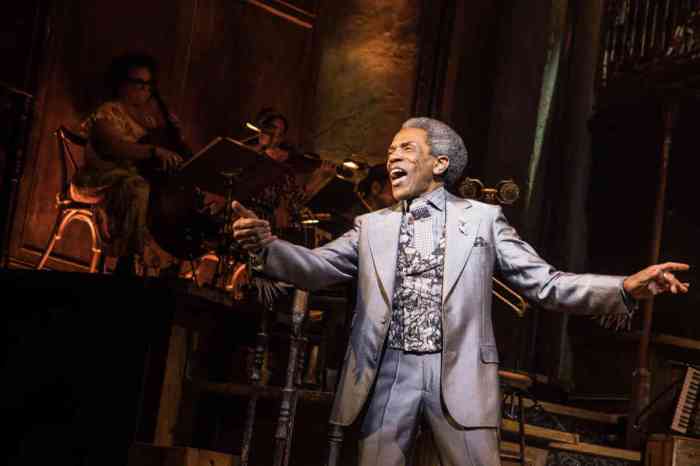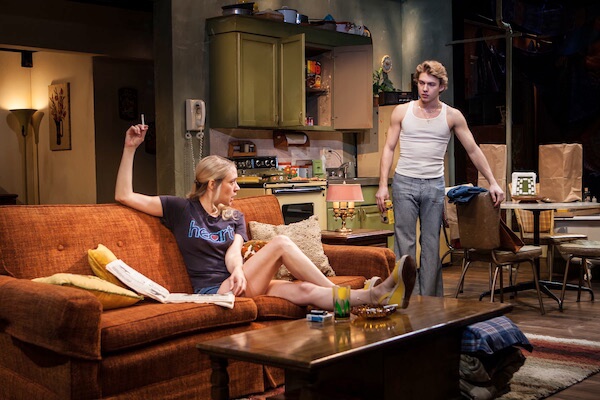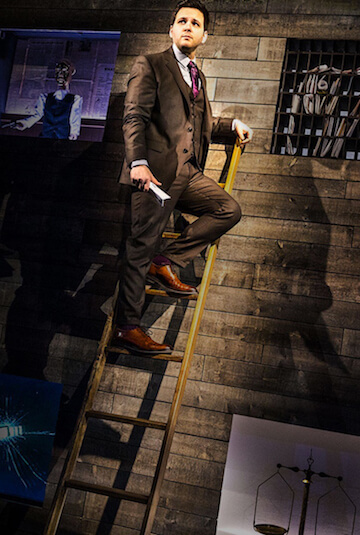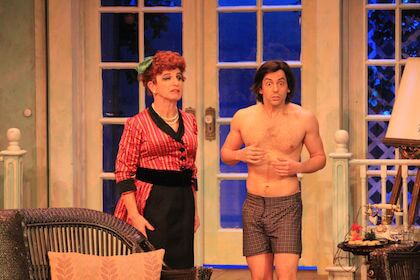Phillipa Soo and Lucas Steele in Dave Malloy’s “Natasha, Pierre and the Comet of 1812.” | THE HARTMAN GROUP
Tolstoy has provided the inspiration for what is easily the most exciting new musical of the season. “Natasha, Pierre and the Great Comet of 1812” takes one 200-page section of “War and Peace” and creates a spellbinding story of manners and society remarkable for its brilliant structure, the clarity of its storytelling, and its inspired music.
Creator Dave Malloy — book and score — has concentrated on the scandalous love affair between handsome but roguish soldier Anatole and the young countess Natasha, engaged to Prince Andrey who is off at war. Against the advice of her friends, Natasha abandons her engagement and almost elopes with Anatole, until Pierre — married to his sister Hélène — informs her that Anatole is already married. Yes, it’s that kind of Russian tale.
Complications abound in Dave Malloy’s Tolstoy-inspired masterpiece, Richard Nelson’s émigré tale
Amazingly, Malloy keeps it all crystal clear, starting with a magnificent opening number that spells out the relationships among cast members in a way that combines repetitive learning (a tactic known to work on “Sesame Street”) with infectious and very adult music. Rachel Chavkin’s inspired direction makes every moment count. The story comes to a head as Natasha is just barely saved from ruin and Pierre muses on what the comet streaking across the sky portends for the future. The grand and magical theatricality is breathtaking, and the Russian-inspired meal that comes with your ticket adds to what is nearly a perfect evening.
Presented at Kazino, a supper club created in an oversized tent in the Meatpacking District, the show is a superb marriage of the classic in Paloma Young’s terrific period clothes and the contemporary in Malloy’s pop-inspired score for the sung-through show. The cast is consistently outstanding. Malloy, who also plays Pierre, is a bearish avuncular presence, the perfect avatar of the old order on the wane. Phillipa Soo as Natasha is simply ravishing, both to look at and in her singing. Lucas Steele, as Anatole, offers many surprises, including a voice that blends perfectly with Soo’s. His technical proficiency is not often seen in musicals. Brittain Ashford is Natasha’s pragmatic cousin Sonya, done up to look plain, and Grace McLean, as her godmother Marya, is a stalwart presence with a sophisticated ability for the comic turn.
The eight-piece orchestra is similarly exceptional, and Matthew Hubbs’ sound design is the best you will hear in New York. Mimi Lien’s set envelops you in the world of the show and includes many amusing touches, including a large portrait of Napoleon presiding over it all and chandeliers, which come to represent the comet, inspired by Gino Safatti’s Sputnik design. Like the comet itself, shows of this caliber come around very rarely indeed, and when they do they are not to be missed.
Richard Nelson’s ambitious play “Nikolai and the Others,” now at Lincoln Center, has aspirations as grand as his characters who include George Balanchine and Igor Stravinsky. Unfortunately, his reach exceeds his grasp, and the play, bogged by down by too many themes and variations, is often confusing.
A group of Russian émigrés in the US immediately after World War II have gathered at a farm in rural Connecticut ostensibly to revel in their heritage and grab a respite from the hurly burly of New York. We watch the preparations for Balanchine’s “Orpheus,” which he created with Stravinsky, the challenges facing Sergey Sudeikin, an elderly set designer, in finding work, and the tribulations of title character Nikolai Nabokov, a composer of some note back in Russia, working with the US government to help his fellow émigrés adjust to their new country. Lingering in the background are the looming threat of being tarred as a communist, the difficulties and alienation of being a transplant, and the solace one hopes to find in friends from the old world.
Nelson’s 18 characters have a lot to do in two-and-a-half hours, and the inevitable sketchiness is frustrating — right from the get-go. In the play’s opening section, when everyone gathers for a dinner at the farm, it’s a struggle to understand who the characters are and what their relationships might be. David Cromer is a master of naturalistic direction, but with characters sitting with their backs to the audience, it can be hard to hear, at least toward the rear of Lincoln Center’s relatively small Newhouse Theater.
What we do know at the end of this sequence is that everyone wants something from Nikolai and he becomes increasingly frustrated in realizing that only then do people turn to him.
The piece has its inspired moments. The rehearsal for “Orpheus,” is a gem, and Stephen Kunken’s performance as Nikolai — the one character we get to know, is sensitive and beautifully nuanced. Marsha Ginsberg’s versatile set is a masterpiece, and after the opening scene, Cromer’s direction has his typical understated style and focus.
The cast is a list of stage luminaries, including Michael Cerveris as Balanchine, John Glover as Stravinsky, Blair Brown as Vera, Stravinsky’s current wife, Kathryn Erbe as Natasha, his ex-wife, and Alvin Epstein as Sudeikin. As wonderful as it is to see them all, they are largely held back from fully realized performances by their characters’ shallowness as written. “Nikolai and the Others” seems as long as a Russian winter.
NATASHA, PIERRE AND THE GREAT COMET OF 1812 | Kazino | W. 13th St. at Washington St. | Tue.-Fri. at 8 p.m.; Wed. at 2 p.m.; Sat. at 5:30 & 9 p.m.; Sun. at 1 p.m. $125-$175 at ovationtix.com or 866-811-4111
NIKOLAI AND THE OTHERS | Mitzi E. Newhouse Theater, Lincoln Center | 150 W. 65th St. | Tue.-Sat. at 8 p.m.; Wed., Sat. at 2 p.m.; Sun. at 3 p.m. | $75-$85 at telecharge.com or 800-432-7250



































